
The Free Press

TEL AVIV — A handsome man in his 20s in a military uniform zips past me on a motorized scooter. A woman with a tattoo and piercings calmly sips a cortado in a coffee shop across from me. A young family bustles past. This is Israel in 2023.
I am on my way to a screening of “raw” footage of the October 7 massacres that Hamas committed against Israeli civilians. Atrocities that are being denied and dismissed across social media and in parts of legacy media internationally. “In 2023 we are still dealing with Holocaust denial,” says my contact in the IDF media unit. “This event is an attempt to put that right.” This is also Israel in 2023.
Devices were banned. No photos or recordings. It is, we are told, just too awful. And so it is that at 11:30 local time, around 250 international journalists file into a military base in a Tel Aviv suburb. Hundreds of bottles of water are laid out. The staff are smiling and friendly.
I’ve never seen Israeli press officers so professional and slick and—indeed—charming. If this sounds glib, it’s not. This is a country that has traditionally favored hard power above all else, often to the detriment of its messaging. Now they are desperate to show the world what they are facing.
The venue is a lecture hall with a large stage. October 7th, 2023. Hamas Massacre. Collected Raw Footage. is the title on a screen that covers the back wall. We are reminded again that no devices are allowed. There are issues around the anonymity of victims, especially those still alive—raped or taken hostage.
IDF spokesman Daniel Agari steps up to deliver some preliminary remarks. “We want people to understand what we are fighting for,” he says. “This is something else. Something has happened to Israel. This is not about rage or righteousness but the sense that this is a crime versus humanity. This is good versus bad. Death versus life. These [terrorists] will do anything. And it’s nothing to do with Islam,” he adds. It is a refrain I hear through the event. Clearly the word has come down to make a clear separation between Hamas, the wider Palestinians, and above all, with Islam.
What is also clear is the emotion. Agari is technically a media mouthpiece, but he veers into rhetoric. “Why did they strap GoPros to themselves? Why do they call the family of who they murdered? Because they are proud of what they did.”
He continues. “Rape—where is Islam? Burn—where is Islam? Behead—where is Islam?. . . . They killed babies, old people, sick people. . . we won’t allow the world to forget who we are fighting. Hamas wants dead Gazans. You don’t take human shields; you don’t burrow under hospitals otherwise. This is Hamas, not Palestinians.”
He steps off the stage. The footage starts: we see several Hamas terrorists sitting on the back of a truck as it enters Israel. They whoop and cheer. They fan into the street, shooting at cars. They drag blood-drenched corpses out of vehicles, onto the street. A female body is thrown onto the road. “Allahu Akbar! Allahu Akbar!” they cry.
Terrorists fan into streets and across a roundabout. They have the run of the place. The security failures here are monumental. Some men enter a kibbutz. An Israeli civilian car pulls up and the driver leans left to speak to the guard he assumes is sitting in the checkpoint. A terrorist emerges from his right and shoots. Blood spatters the inside of the car. It smears the windshield.
The screen cuts to inside the kibbutz. The view is from a GoPro strapped to the body of a terrorist. His automatic rifle juts out just like they do on the screen in Call of Duty. This is deliberate; ISIS did the same thing. It is the gamification of terror.
A dog appears, running eagerly toward him. He lowers the rifle and shoots at the animal. It crumples to the ground. Strangely, of all the killings we see on-screen over the course of that morning—and we see slaughter after slaughter—this gets the loudest gasp of revulsion.
I am, I realize, watching a montage of atrocity. And it gets worse. A terrified Israeli man in his underpants, and his two young children, also in underclothes, run screaming. Thugs clamber down from a truck and throw a grenade into the cubbyhole where they have taken refuge. The father’s body, covered in blood, falls onto the ground. Terrorists take the two children—covered in their father’s blood—into a room. “Daddy’s dead,” one screams to his brother. “It’s not a prank. He’s really dead. I wish I was dead! I wish I was dead!” Even within the litany of horror I’ve witnessed in my career, this is horrifically unsettling.
A new scene depicts a man in a football shirt lying on the ground covered in blood. He moans in pain. A terrorist picks up a hoe and starts smashing him over the head—over and over and over again. “Allahu Akbar!” he screams, over and over and over again.
A dancing woman appears on screen. She is dressed in a crop top and tiny shorts, laughing and smiling. In the next scene, revelers are crouching on the ground as terrorists stream across the field. Partygoers run screaming. People are dragged from their cars. Bloodied corpses are thrown into the dirt while Hamas cheer and whoop.
I am watching a celebration of life alongside the fetishization of death.
Some audio plays and a translation of the Arabic pops up on the screen as a Hamas terrorist calls his father: “Father, I killed 10 Jews! Check your WhatsApp! I sent you the photos! Father, I killed 10 Jews! I killed 10 Jews with my bare hands. Check your WhatsApp. Father, be proud of me!”
I’m starting to lose all sense of time. A terrified, handcuffed female hostage is dragged out of a truck amid cheering crowds. We are shown images of the burned babies, so small you could cradle them in the crook of your arm. One journalist tells me the blanket it was swaddled in is one of those given to newborns.
The terrorists shoot indiscriminately—even at portable toilets, which they then film, displaying blood-spattered toilet seats with pride. In a final scene, terrorists break into an office and spy a man cowering on the floor by a desk. They bark questions at him. They’re quizzing him on something—he starts to shout “Allahu Akbar!” But clearly, it’s not enough to satisfy them and they blow him away.
The sustained sadism stops, finally. And I wander outside to drink water and decompress. We are called back in to a briefing from General Mickey Edelstein from Gaza Command. “They came to kill and burn civilians. Not military personnel. Civilians,” he says. “I’ve been fighting Hamas for many years, but I honestly never thought they’d be this violent.”
He continues. “We told civilians to evacuate northern Gaza. Yes. [We go in] and there are civilian casualties. But we are not looking for kids to kill. We are not looking to kill hostages because they are not walking fast enough. We do not find kids and then force them to go and ask their neighbors to come out, and then when they do, kill them.”
He moves on to less emotive ground. “We have evidence of Iranian involvement,” he says. “I cannot elaborate too much, but there are trained cells within Gaza.” Written instructions were discovered on captured and killed terrorists, he adds. This may have been an orgy of sadism and bloodlust, but it was also a planned military exercise.
A question comes in about the huge security lapse that allowed all this to happen. Edelstein slips into thought. “We failed,” he says quietly. “We failed.”
The event ends. I leave and reflect on what we have seen. Those images are but one horrific event in a broader conflict that is tragic in the truest sense of the word because there are no good options. The occupation, the suffering of Gazan civilians, the endless, endless violence. Israel is responding, because it has a duty to—just like it has a duty to safeguard the lives of Gazan civilians.
But something else is clear, too. Something that the footage confirmed. What happened on October 7 had nothing to do with resistance. It had nothing to do with occupation or a one- or two-state solution. It was about something far more ancient and atavistic—the desire to kill Jews wherever they are and whoever they are. And against that, there can be no retreat.
This piece is reprinted with permission from UnHerd, where it originally appeared and where David Patrikarakos is a foreign correspondent. Follow him on X (formerly Twitter) @dpatrikarakos.
To support our mission of independent journalism, become a Free Press subscriber today:


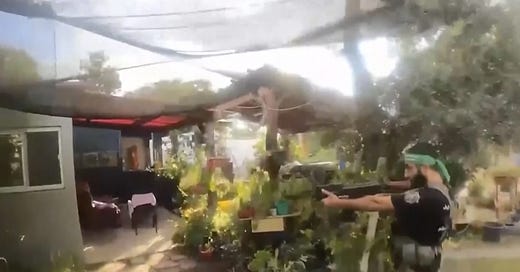



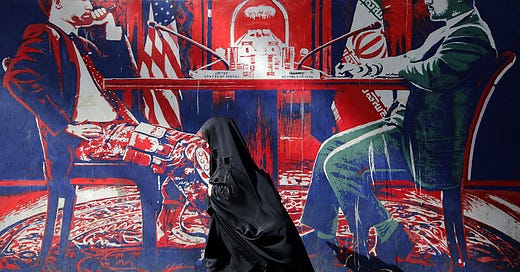
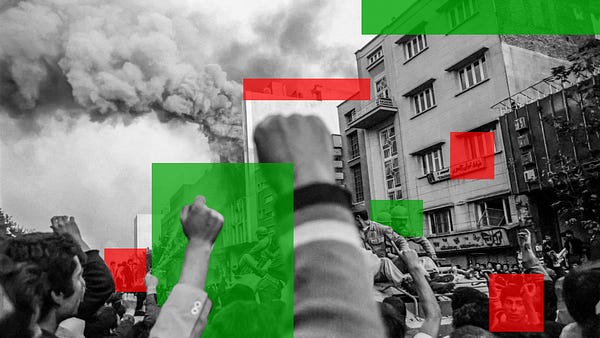

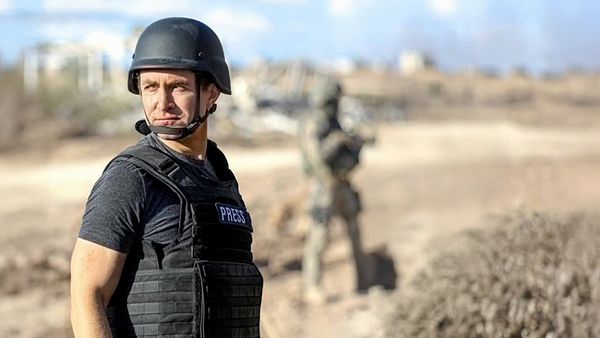

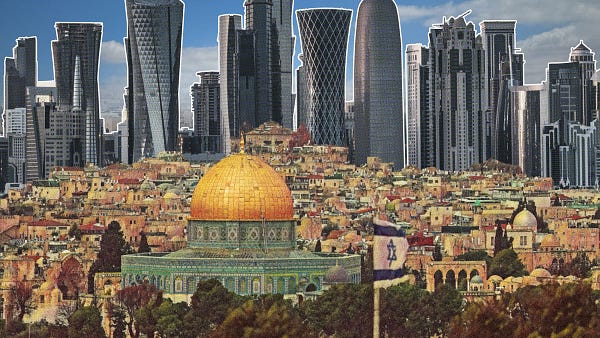

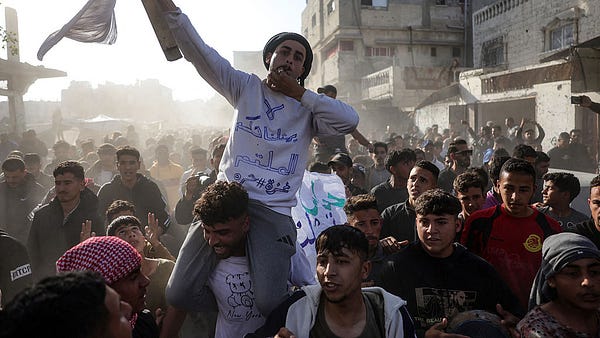

Do not let up.
Absolutely heartbreaking.